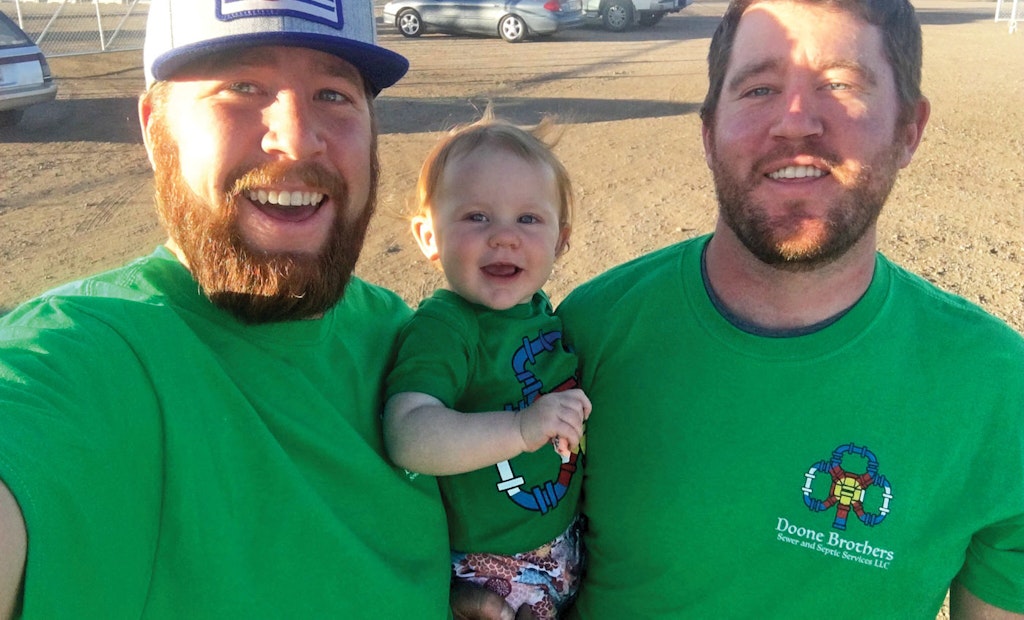Interested in Education/Training?
Get Education/Training articles, news and videos right in your inbox! Sign up now.
Education/Training + Get AlertsIn States Snapshot, we talk to a member of a state, provincial or national trade association in the decentralized wastewater industry. This time we visit a member of the Colorado Professionals in Onsite Wastewater.
Seamus Doone, co-owner
Business: Doone Brothers Sewer and Septic Services, operating out of Lakewood and Arvada, Colorado, mostly serving mountain communities on the eastern slope of the Rocky Mountains. Seamus owns the company with his brother, Kellen, 34.
Age: 31
Years in the industry: We’ve owned our company for about five years but have been in the industry for the better part of a decade.
Association involvement: We’ve been members of the Colorado Professionals in Onsite Wastewater for about three years. Starting in September 2019, we are their installer trainers, teaching the National Association of Wastewater Technicians courses.
Benefits of belonging to the association: Being members keeps us informed about the newest stuff that’s going on in the industry. We also form a lot of good relationships with the other people in it.
Biggest issue facing your association right now: Colorado seems to have everything pretty buttoned up as far as that goes, but ongoing efforts include ensuring good communication with installers. They currently have no issues getting members, considering how much work is out there right now.
Our crew includes: We have two employees, Phil Cooper and Pat Keyes.
Services we offer: The majority of our work is septic installations (mostly advanced treatment systems), repairs and inspections.
Typical day on the job: I’ll go to the job sites and work there for the day. Then I go home, and after the kids get down, I get back on the computer and start drumming up business. We also do two to four meetings at different job sites every week, doing a semi-inspection and quoting the job.
The job I’ll never forget: Water is always an issue here. We ran into one job where we didn’t hit any water until the very end of the drainfield, and then it started coming in. It was a surprise. We had dug all the test pits and there wasn’t any water. We had to redo the entire system. We moved it uphill. We always build a clause into the contract for these situations. It’s mostly just charging for time, it’s not throwing some massive expense on. It takes an extra day or two, and the engineer has to sign off on it and come back out and redo everything.
My favorite piece of equipment: Our Caterpillar 308 full-size excavator has power and versatility. It’s small enough to get in anywhere, and it’s big enough to do any job.
Most challenging site I’ve worked on: Working in the mountains, we always run into rocks. On one site, all the offsets were exact. We had to put two fields in and a tank, and it was a small lot. Everything had to be exactly the right offset from the house. A blasting company had to come in and dynamite the field so we could actually dig it. When you blast, you lose a lot of regular dirt and you’re left with a lot of rock. You have to remove the rock and bring in other material to backfill over the field.
Oops, I wish I could take this one back: We sometimes have issues with customers wanting to add on to a project but not wanting to pay for it. For example, we dug a foundation for a home where we had to execute a grade plan without a grade plan, and then they ended up bringing in a grade plan after we were done and telling us we had to reexecute to that plan. You don’t want to take on work where you don’t know when you’ll be paid and or how the money’s going to be paid — unless you’re getting paid in escrow. But then they often want you to start before the actual closing date of the house.
If I could add any wastewater-related service, it would be: Bigger systems.
The craziest question I’ve been asked by a customer: How does the water get to the field?
If I could change one industry regulation, it would be: Sometimes providing gradation reports on sand of less than 30 days is difficult because most pits don’t have gradation reports on their sands within 30 days. So you have to get an independent company to do it. But the counties are being really good about it. Actually I really do support all the regulations. They all make sense. I think it’s good to treat water. That’s obviously what the goal is on all of this. I know it makes it a little more difficult on homeowners sometimes when they’re buying or selling a house, but in the end, the idea is just to have water that’s treated. I support all that.
Best piece of small-business advice I’ve heard: “Don’t let anything get you rattled.” The guy who told me that, Jim Solomon, owner of The Pool Man, said it a little more colorfully than that.
Planning for the future: We want to just keep growing and expanding into more areas of the state and moving into as many areas of onsite wastewater as possible.
If I wasn’t working in the wastewater industry, I would: Probably be in marketing. That’s what I got my degree in. My brother has a degree in accounting.
Crystal ball time – This is my outlook for the wastewater industry: I think this industry is great. My hope for the future is that fewer people will go onto big pipe and more people will start using onsite wastewater systems. They provide better water treatment and you maintain and retain the water you’re pulling out of the ground. You’re putting it right back to where it came from.






